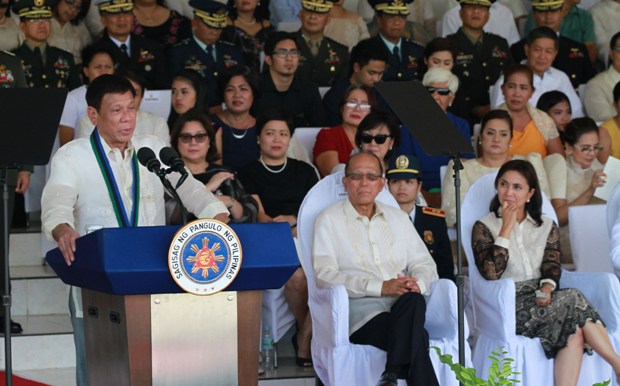Headline
President Duterte signs EO No. 1 reengineering OP towards ‘greater responsiveness’
MANILA – President Rodrigo R. Duterte has issued Executive Order No. 1 reengineering the Office of the President (OP) towards greater responsiveness to the attainment of development goals.
In a media interview, Presidential Spokesperson Ernesto Abella said the EO aims to streamline the functions of the OP.
“Basically, it’s streamlining, you know. I think it’s stated it’s basically just to streamline so that it’s not repetitive, it’s not redundant,” Abella told the media.
According to the EO, the OP is mandated to manage overall development process and advance national development goals stipulated in the Philippine Development Plan, the President’s Inaugural Address, and the President’s Governance Agenda.
“The administration aims to advance development goals and uplift the quality of life of all Filipinos through a holistic, convergent, and participatory approach to leadership and governance,” the EO stated.
“The Office of the President consists of various agencies that carry out responsibilities pertinent to development and management, general government administration and internal administration,” it added.
The Duterte administration’s first EO also provides that the attainment of national development goals requires the efficient, responsive, and just allocation of resources by eliminating duplication or overlapping of common functions, maximizing resource utilization with minimum disruption to operations, coordinating efforts more closely, sharing information and consistently working in a collaborative manner.
Under the OP, the Executive Secretary, Cabinet Secretary and Special Assistant to the President endeavor to proactively collaborate to promote the efficient delivery of services.
The Cabinet Secretary shall have supervision over the following agencies: Cooperative Development Authority, Housing and Urban Development Coordinating Council, National Anti-Poverty Commission, National Commission on Indigenous Peoples, National Commission on Muslim Filipinos, National Food Authority, National Youth Commission, Office of the President-Presidential Action Center, Philippine Commission on Women, Philippine Coconut Authority, Presidential Commission on the Urban Poor, and Technical Education and Skills Development Authority.
“With the supervision of the Cabinet Secretary, these agencies shall primarily evaluate existing poverty reduction programs and, if deemed necessary, formulate a more responsive set of programs complementing existing ones, channeling resources as necessary to reduce both the incidence and magnitude of poverty,” according to the EO.
The EO also consolidates the office and function of the Office of the Special Assistant to the President, the Office of the Appointments Secretary, and the Presidential Management Staff under the Special Assistant to the President and Creating the Office of the President-Events Management Cluster.
“The Office of the Special Assistant to the President (OSAP), the Office of the Appointments Secretary, and the Presidential Management Staff (PMS) are hereby placed under the oversight of the Special Assistant to the President (SAP),” it said.
In a related manner, the Office of the President-Events Management Cluster (OP-EMC) is hereby created to ensure effective collaboration among the offices and/or units involved in the preparations for and management of Presidential engagements. It shall be composed of the PMS, Presidential Security Group (PSG), Office of the Chief Presidential Protocol, Media Accreditation and Relations Office (MARO), and Radio-Television Malacañang (RTVM).
The OSAP shall be composed of the Private Offices of the President, including the Appointments Office, which shall handle the scheduling of activities of the President; and the Presidential Management Staff (PMS), including Presidential appointments processing, and management of Presidential engagements as lead of OP-EMC.
The OSAP shall also be headed by an appointee with the position Presidential Assistant II with the rank of Secretary, who shall oversee and supervise the implementation of improvements in the systems and processes in place to maximize efficiency and effectivity in management.
The PMS, on the other hand, shall support the Executive Secretary in the provision of policy inputs to the President in the management of the affairs pertaining to the Government of the Republic of the Philippines; and to the Cabinet Secretary in the provision of substantive and logistical support to the Cabinet and in the monitoring and execution of Cabinet directives.
Section 17, Article VII of the 1987 Philippine Constitution provides that the President shall have control of all the executive departments, bureaus and offices.






















